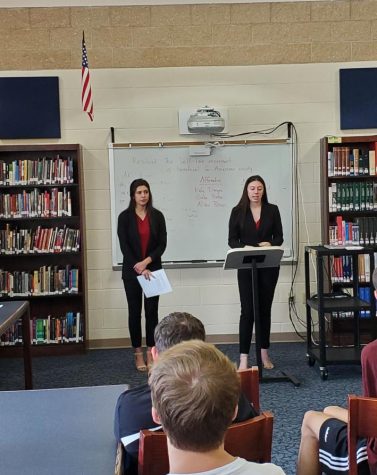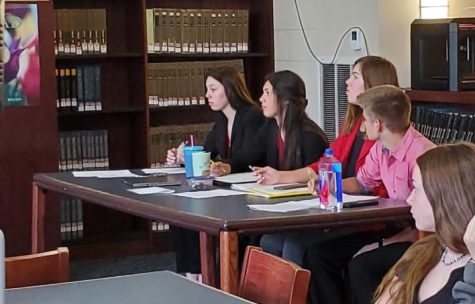Final Pitt Debate Held in Media Center
May 24, 2022
On May 20, the Pitt debate class delivered a debate in the media center for different classes to watch and enjoy. Pitt debate is an elective that runs two semesters throughout the year. The University of Pittsburg runs the program.
The debate has to be delivered in front of an audience and advisor Grant Leonard must film it. The funding is dependent on these videos to prove that the program is running to the standard of the University of Pittsburg.

The debate topic was “Is self-love beneficial for American progress?” junior Gabe Rader, and seniors Alsion Brown, and Kate Traeger were the affirmative (meaning that they are arguing that self-love is beneficial); seniors Aiyana Eller, Grace Macerelli, Gabe Ragland, and Abby Shaw were negative.
Each side spent a week preparing their contentions and questions to argue their own side as well as predict what the other team may say.
A formal debate includes one contention, one cross-examination, and two rebuttals for each side.
 The first contention that the affirmative argued is that the self love movement isn’t about being selfish, but about knowing when you need to help yourself before others. The affirmative argued that putting yourself first does not mean you demean others to make you feel better, but take into account what’s best for you without causing hurt to someone else.
The first contention that the affirmative argued is that the self love movement isn’t about being selfish, but about knowing when you need to help yourself before others. The affirmative argued that putting yourself first does not mean you demean others to make you feel better, but take into account what’s best for you without causing hurt to someone else.
The contention the affirmative presented was being mindful of your own emotions isn’t toxic. You can’t keep giving when you have nothing left to give. They stated that tempting to please and love others before learning to love and please yourself is emotionally and physically draining. Low energy and a bad mood could be solved simply by taking the time for yourself.
Their second contention was that the movement doesn’t promote toxic positivity, but prioritizes your well-being and makes sure that your own personal needs are being met. Being there for yourself also allows you to be there for others.
Their final contention was that the movement is responsible for creating and establishing more mental health resources and safe, friendly environments, and has created a much less self-critical environment in America than it used to be.

The Negative had four contentions, which Ragland and Macerelli presented in the constructive.
The negative’s first contention was that the movement promotes narcissism and hypocrisy, claiming that the person taking part in the self love movement allows you to be completely self-absorbed within yourself. You can’t be a benefiting human society if you’re only focused on yourself.
Their second contention stated that the self-love movement slows or stops any growth within a person. Rather than working on an issue, it encourages you to accept yourself as you are without acknowledging personal health.
Their final contention explained that it causes an absolute mindset, and creates a fake reality in your head that the person makes up. Which is very unhealthy for the person and for society.
The negative also focused on the ideas of self versus society; as the topic was about whether the self love movement benefits American society. They stipulated that whatever effect the self love movement had, it doesn’t transcend to the level of causing a change in the entire society.
There were five total votes to determine the winner of the debate. Leonard had a vote, as well as the three teachers who attended the debate as judges: English teacher Sarah Buttiens, math teacher Tim Johanning, and German teacher Brittany Farrell.
At the end of the debate, Farrell and Johanning chose the negative, while Buttiens and Leonard chose the affirmative.
As a result of the tie, the remainder of the Pitt class (those not participating in this debate) voted to break the tie.
The Affirmative ended up taking the win.

